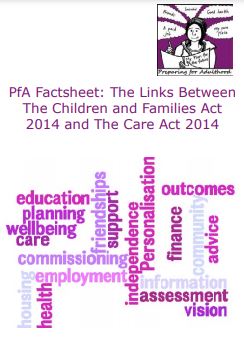Children & Families Act
Under the Children and Families Act 2014 and with the 'Raising the Participation Age' changes, a young person with special educational needs may need particular support as they plan for the next stage of their education or for moving into adulthood. The SEN system places particular focus on helping young people above 16 prepare for their future.
What support is there to help my child prepare for the future?
Schools must include preparation for adult life in the curriculum and provide independent career advice to young people from age 14 onwards. This includes advice tailored to the needs of young people with SEN and disabilities. Planning should start early and young people should be at the centre of the process.
For pupils with an Education, Health and Care (EHC) plan, preparation for adulthood must start when the plan is reviewed in year 9 (age 13/14) and continue every year after that. This should focus on what your child will need to support their move into adult life, including further education, employment, independent living, relationships and staying healthy.
What are my child's options after they turn 16?
Your child can leave school at the end of the school year in which they turn 16 (normally the end of year 11), but this does not mean the end of education. All young people are now expected to stay in some kind of education or training until they are 18. This can be combined with paid or voluntary work.
Your child could:
Please refer to our Post 16 options page for information on Apprenticeships, Traineeships and Supported Internships
What kind of support can my child get in college?
Mainstream colleges must support students with SEN in a similar way to schools do. This includes doing everything they can to identify the needs of students with SEN and putting in place the help they need through SEN support. There should be a named person in charge of support for students with SEN. Students who need more help than the college could normally provid
What support is there to help my child prepare for the future?
Schools must include preparation for adult life in the curriculum and provide independent career advice to young people from age 14 onwards. This includes advice tailored to the needs of young people with SEN and disabilities. Planning should start early and young people should be at the centre of the process.
For pupils with an Education, Health and Care (EHC) plan, preparation for adulthood must start when the plan is reviewed in year 9 (age 13/14) and continue every year after that. This should focus on what your child will need to support their move into adult life, including further education, employment, independent living, relationships and staying healthy.
What are my child's options after they turn 16?
Your child can leave school at the end of the school year in which they turn 16 (normally the end of year 11), but this does not mean the end of education. All young people are now expected to stay in some kind of education or training until they are 18. This can be combined with paid or voluntary work.
Your child could:
- stay on at their school or in another school
- go to a further education college (mainstream or specialist)
- do an apprenticeship http://www.apprenticeships.org.uk/
- do a programme of training and work experience
Please refer to our Post 16 options page for information on Apprenticeships, Traineeships and Supported Internships
What kind of support can my child get in college?
Mainstream colleges must support students with SEN in a similar way to schools do. This includes doing everything they can to identify the needs of students with SEN and putting in place the help they need through SEN support. There should be a named person in charge of support for students with SEN. Students who need more help than the college could normally provid


